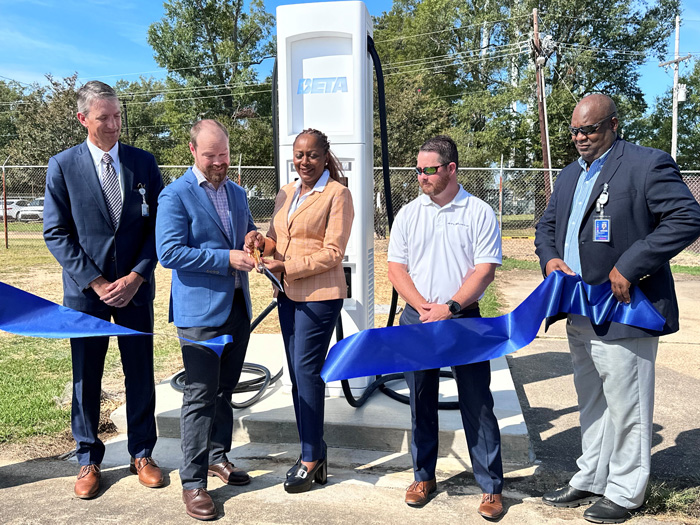Jackson Municipal Airport Authority Partners with BETA Technologies and Atlantic Aviation to Bring Electric Aviation to Mississippi’s Capital
By LSherie Dean, Director of Communications, Marketing & Public Relations
Jackson Municipal Airport Authority

JMAA, BETA Technologies and Atlantic Aviation are bringing electric aviation infrastructure to the state’s capital region.
The Jackson Municipal Airport Authority (JMAA) recently announced a groundbreaking partnership with BETA Technologies, a leading electric aerospace company based in Burlington, VT, and Atlantic Aviation to bring cutting-edge electric aviation infrastructure to Mississippi’s capital. This collaboration represents a significant stride toward sustainable transportation and innovative aviation technology in the state.
Powering the Future of Aviation
As part of this pioneering initiative, Atlantic Aviation, the global fixed-base operator (FBO) at Jackson-Medgar Wiley Evers International Airport (JAN), will host BETA’s advanced electric aircraft charging station. BETA’s charging stations are designed to be multimodal and interoperable, compatible with both electric air and ground vehicles. This installation will make Jackson a key player in the electric aviation revolution, enhancing passenger travel, e-commerce and healthcare services in the region.
“We are thrilled to partner with BETA Technologies and Atlantic Aviation to bring this state-of-the-art infrastructure to Jackson,” says Rosa Beckett, CEO of JMAA. “This collaboration not only positions JAN at the forefront of the electric aviation movement but also strengthens our commitment to providing sustainable and innovative transportation solutions for the people of Mississippi. We welcome this partnership and look forward to the enhanced connectivity, economic growth and healthcare access it will bring to our airport, the Jackson area and the state.”
A National Network of Sustainable Innovation
Jackson-Medgar Wiley Evers International Airport joins a select group of airports in BETA Technologies’ growing network of electric aviation infrastructure along the East and Gulf Coasts. Currently, BETA has brought chargers online at 23 sites across the United States, with plans to expand to more than 50 additional sites.
BETA’s charging stations at JAN will include a Level 3 Fast-Charger located airside, designed to serve both electric aircraft and airport ground vehicles, as well as a Level 2 Charger landside for electric ground vehicles. These installations will be essential in building a sustainable and cost-effective transportation network that serves various purposes, including medical cargo, patient transport and passenger travel.
Partnership with Mississippi Universities and Healthcare Providers
In addition to the infrastructure at JAN, BETA Technologies has entered into a memorandum of understanding with the University of Mississippi Medical Center (UMMC) and Mississippi State University (MSU). This collaboration aims to explore the use of next-generation aviation technologies for medical transport and disaster response, leveraging electric and unmanned aircraft to enhance patient care and emergency services.
“We are always looking for ways to improve how we take care of our patients,” says Dr. Alan Jones, UMMC Associate Vice Chancellor for Health Affairs. “UMMC welcomes this partnership with BETA and MSU to explore how advancements in and increased usage of electric and unmanned aircraft can provide easier, faster, more accessible solutions that can significantly improve clinical outcomes and the lives of Mississippians and beyond.”
Jim Martin, MSU Associate Vice President for Research, echoes these sentiments, highlighting the potential impact of the partnership, saying, “MSU researchers are at the forefront of air and ground mobility, and growth in charging infrastructure helps us carry out that work as we seek to bridge the gap between research and the commercial uses that will benefit our state and country.”
Building a Greener Future
BETA’s UL-certified chargers, adopted by industry leaders such as Archer Aviation, Signature Aviation and the Department of Defense, continue to expand electric aviation networks across rural and metropolitan areas.
“We’ve seen nearly every form of transportation begin the shift to electric because of the lowered costs, increased reliability and focus on enabling future operations,” says Nate Ward, BETA’s Head of Network Development. “As that shift continues to happen, these chargers will help increase access and connectivity among regional and rural communities across Mississippi and the country more broadly. They will help equip communities like Jackson for better medical, cargo and passenger transport going forward.”
John Redcay, Chief Commercial & Sustainability Officer at Atlantic Aviation, expressed excitement about this joint venture, remarking, “Atlantic is excited to partner with the teams at JMAA and BETA Technologies to help make community-beneficial electric aviation a reality in Mississippi. Our partnership with BETA is a key component of our commitment to sustainability and innovation in the aviation industry. We are proud to be laying the groundwork for a cleaner, more connected future, enabling essential services and expanding access to urban and rural communities across the region.”
Paving the Way for Electric Aviation in Mississippi
This collaboration among JMAA, BETA Technologies and Atlantic Aviation marks a bold step forward in building a more sustainable and connected future for Mississippi and the surrounding region. By embracing electric aviation, Jackson-Medgar Wiley Evers International Airport ensures that Mississippi remains at the forefront of transportation innovation, setting the stage for economic growth, healthcare advancements and a greener, more efficient future for air travel.